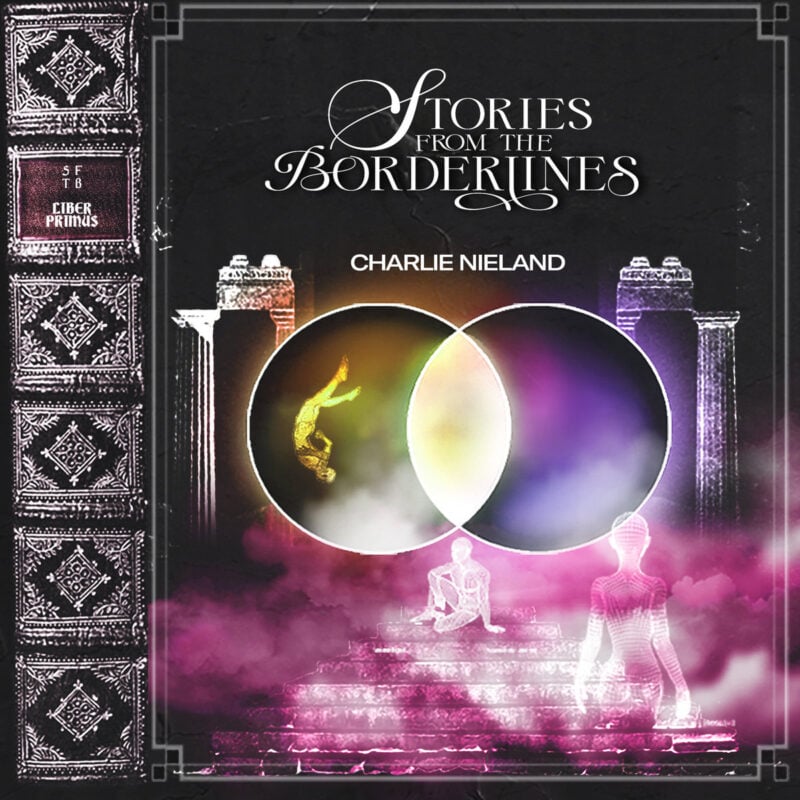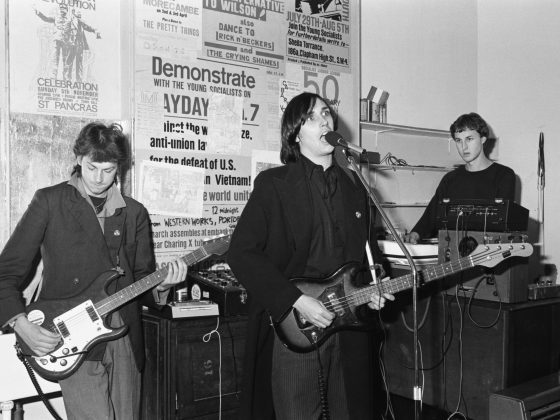New York post-punk stalwart Charlie Nieland storms back into view with Stories From The Borderlines, an album that feels like someone wired a confessional booth to a particle accelerator and hit the big red button. The veteran producer and post-punk polymath tears into his own history like a man mapping fault lines beneath his feet. Years with Her Vanished Grace, the knife-edge experiments of Lusterlit, and studio time with names the size of Blondie and Rufus Wainwright have sharpened his instincts.
The record begins as a flare on the horizon and expands into something closer to a living atlas. Nieland calls it “a kaleidoscope of styles,” and for once that tired phrase lifts off the page. “They are luminous secret rooms that reflect one human’s heart in a world at the precipice. Staying creative is resistance…Culture is not imaginary…These songs tell stories of growing up, of how we got severed, and how we connect.” He’s handing you a set of keys to rooms he spent years building, each with its own weather system, each humming with the tension of the past few years’ love, uncertainty, and family drama. “These songs are a geography of intention and intuition…Let’s find the switch.”
What he’s made here feels like a carved-out planet. The inspirations: David Bowie, Kate Bush, Peter Gabriel, Cocteau Twins, Thomas Dolby, Love & Rockets, The Cure – orbit the album. He played nearly everything himself, with drummer Billy Loose and guitarist Dan McAssey slipping into the frame like old allies who know the terrain well enough to add sparks without calling attention to their hands. “It’s a joy to be collaborating with them,” he says, and you can hear that joy pulse in the seams.

The album opener Cease To Turn studies duality with the patience of a scientist staring down a microscope. It moves from the personal to the planetary in a single breath, suggesting that identity forms in the gaps between collisions—worlds brushing past one another, memories dissolving before they’re named. Brutalist Monuments drags humanity to the mirror and forces us to look at what stares back: a species built on rubble, convinced its jagged edges mean progress. It’s a song about the architecture of error, showing how easily evolution trips into hubris and how quick we are to crown our own confusion as triumph.
Win (feat. spiritchild) turns the spotlight toward crisis as performance. Manufactured emergencies, outrage as oxygen, language sharpened into blades. The track cuts through the spectacle and exposes how fear becomes a mask welded to the face, how shame is cultivated like a crop, and how the only escape is recognizing the bone-deep interdependence we keep running from.
Drown feels like a dream where the tide doesn’t know the difference between myth and memory. Loss mutates into legend; catastrophe becomes choreography. Waves crash through the song like messages written for the dead, and the unanswered questions thrum beneath every line.
Hypnotized stalks the ruins of national mythology. Dragons, protectors, rituals…all crumbling under the weight of war, displacement, and political sleight of hand. It’s the sound of people realizing the creatures guarding their treasure never cared, never understood, and never could save them. Next, Back To Life peers into the wreckage of two people trying to reanimate a corpse: love warped by insecurity, regret, and the slow poison of self-doubt. The connection spirals between surrender and desperation, a fairy tale rewritten with cracked mirrors and spent prayers.
Redshift lifts everything skyward. A supernova of self-reassessment, the track uses astrophysics as therapy. Redshift (the stretching of light as it speeds away) becomes the metaphor for loosening the grip of old pain. Nieland bends time with patient guitars and a voice that rises like a lantern in the cold. Inner walls crumble; clarity cuts through like cosmic radiation.
Sentinel paints a watcher at the edge of everything—someone drifting between longing and distance, capturing moments as if they were vanishing fireflies. Time feels delicate here, fragile enough to slip through cupped hands. Control becomes a question, not an answer.
Then there’s Shame, paired with a wild timebending video by Hypnodoll with cinematography by Alice Teeple. This one thrums with the dangerous charge of obsession turned inward and outward at once. It digs into the lust and revulsion weaponized against the queer community, showing how fascination becomes its own battlefield. The cast: Billy Loose, Dan McAssey, Corey Tut, Larry Heinemann, Lianne Smith, Felice Rosser, Finley Hunt, Stephanie Marie, Susan Hwang, Katia Floreska, Jeb Colwell – turns the screen into a pressure chamber.
Today, featuring keyboardist Joe McGinty (Psychedelic Furs), is quieter in volume but heavier in emotional weight. It highlights the fragile rituals of love, the domestic miracles we overlook until they threaten to vanish. Love becomes a constellation you can lose track of in the dark, and the song treats the present moment like a relic worth dying beside. Finally, You Fell Down threads a story of escape, transfo∆rmation, and heartbreak—two kids running from who they were, only to collide with who they became. Childhood fantasies crumble as the world presses in. One person falls; the other freezes. The track leaves you standing in the wreckage of something once unstoppable.
Stories From The Borderlines is many things: a spark, a confession, a scrawl on the wall of the universe…but above all it’s a reminder that imagination is a survival instinct. Nieland leaps and drags us with him, shouting back through the turbulence: Let’s find the switch.
Listen to Stories From The Borderlines below and order the album here.
Follow Charlie Nieland:
















 Or via:
Or via: